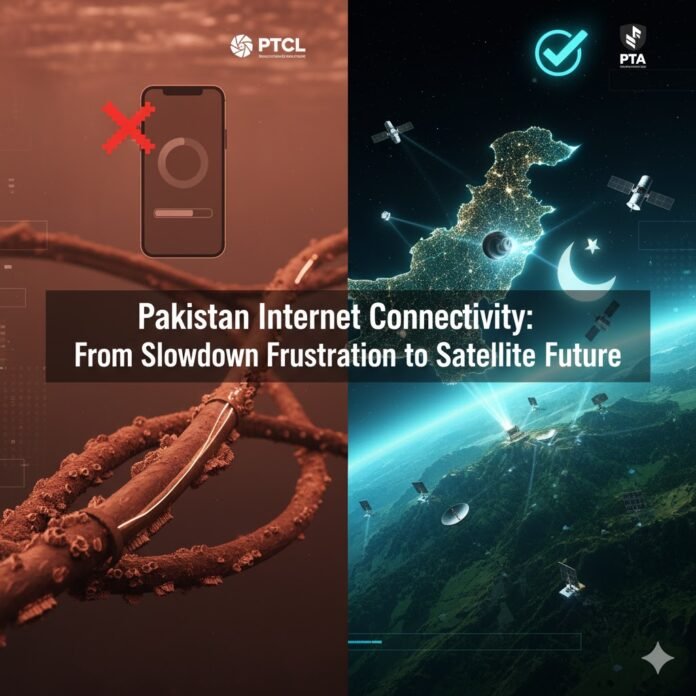Pakistan Internet Connectivity is frequently met with frustration in Pakistan’s digital landscape. A couple of slow internet days can be annoying, but for some, connections are crucial for work, study, and relationships. For the online population of Pakistan, Pakistan Telecommunication Company Limited (PTCL) maintains communication and offers service updates.
In a service advisory, the company stated that there would be slow and disrupted communication for 18 hours at a time, necessary for urgent repairs for the country’s crucial subsea communication cable for the country’s underwater communication network.
It prevents the country’s international digital connections. It had a direct impact on students participating in virtual classes and workers on remote deadlines. Disruptions of services on this scale highlight the excess reliance on such cards and the digital connections they provide.
Reports of effective communication maintenance on July 7, 2023, give praise for maintenance services carried out as planned. PTCL has completed repairs on the cable and returned to service all previously restored communication.
They also reported that the Internet was problem free and speed connectivity returned to normal for the country.
However, concerning the dot city, Karachi, the reality was still buffering. In Karachi, both officials and the common people voiced their concerns and felt confused due to the poor performance and frequent outages of the internet.
Even the use of the internet on social media platforms was, for the most part, underwhelming. Users reported being in the digital slow lane when there was supposed to be a nationwide fast internet suspension. This highlights ongoing issues with Pakistan Internet Connectivity.
An anonymous resident of Karachi, echoing the still likely prevalent sentiments of the populace, explained, “It’s as if the maintenance is done, but my connection was always the last to know. A paged video takes an eternity to upload. Promises are useless. We need something that works.”
This is an example of the widespread public frustration. Despite maintenance being performed on the slow internet, the public was confused and let down, and full speed was offered at the end, resulting in disappointed customers.
As the technicians engaged with the problem related to deep-sea construction, a proactive and forward-looking plan was being drawn simultaneously.
The issuing of Fixed Satellite Services Licenses by the Pakistan Telecommunication Authority (PTA) is a historic step toward Pakistan’s futuristic connectivity, marking the beginning of significant changes in the country’s approach toward enhancing telecommunication Pakistan Internet Connectivity.
PTA’s decision to allow satellite internet access to stakeholders aims to facilitate leading global internet service providers such as Starlink and Shanghai SpaceCom to cater to the country’s underserved satellite internet connectivity remote regions and boost Pakistan’s limited internet accessibility.
This decision balances the PTA’s broadband digital divide and connectivity issues feed through the economically motivated digital telecommunication gaps across underserved remote regions of the country. Improving Pakistan Internet Connectivity is the primary goal.
The PTA’s facilitatory approach to satellite internet access caters to the anticipated demand for lower cost digital connectivity by the underserved remote users, primarily targeting economically active adults, who are the most underserved economically.
Implementing PTA’s framework for satellite internet access will expedite the digital connectivity of economically active adults remotely located to participate in the country’s digital economy without the cumbersome expense and effort of installing backhaul internet infrastructure. This is a game-changer for Pakistan Internet Connectivity.
PTA’s Framework requires gateway access for Ground Earth Stations (GES) facilities and the construction of gateway stations in the FSS operator access licenses. VSAT licenses encompassing Very Small Satellite Earth Terminal (VSAT) and control stations will be issued for a duration of 15 years and will be issued in blocks. The PTA fee of USD 500,000 incorporates the 15 year claimed service pledge. This fee structure supports the expansion of Pakistan Internet Connectivity.
The two accounts, one regarding the comical resolution of mismatched cable hitch and the other concerning the optimistic recognition of space-age connectivity for the future, exemplify the present condition of the digital landscape for Pakistan. The issuance of FSS licensing has been one of the most significant movements towards the construction of a reliable and multifaceted digital groundwork for the nation.
The ability of the country to go operationally digital in spite of the snag on undersea cables exemplifies how resilient and efficient the digital system has become. The country’s internet is, without any doubt, increasingly advancing and improving Pakistan Internet Connectivity. The expansion of Pakistan Internet Connectivity is crucial for growth. This strategic push for enhanced Pakistan Internet Connectivity will benefit millions. Securing reliable Pakistan Internet Connectivity is a national priority. Improving Pakistan Internet Connectivity via satellite is a smart move.



